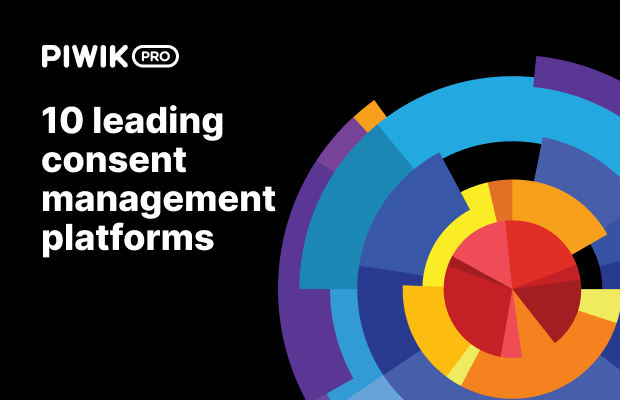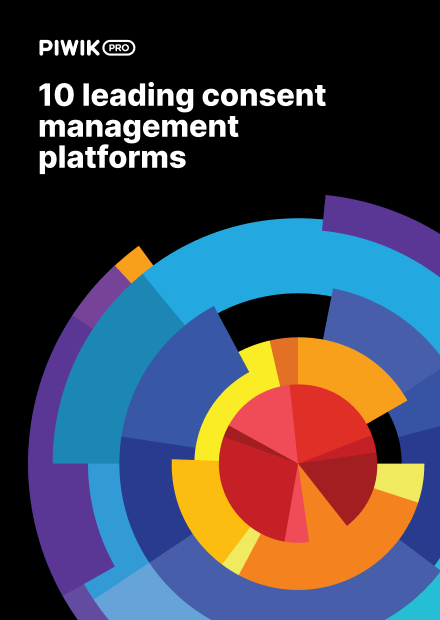GDPR is the gold standard for data privacy regulations, especially with the requirement to collect explicit consent from users prior to processing their personal data. The law has served as an inspiration for other legislation such as Brazil’s LGPD, California’s CPRA, Canada’s CPPA, and Germany’s TTDSG/TDDDG.
In the report by Gartner, it is expected that by 2024 75 percent of the global population will be covered under modern privacy regulations. The forecast for the year 2023 was 65 percent, up sharply from only 10 percent in 2020.
Most data privacy regulations share one goal – to give individuals more control over their personal data. At the same time, with the growing awareness of the importance of privacy rights amongst users, organizations have to take privacy compliance seriously. Users want to know what information is being collected about them. That’s why companies need to precede their marketing activities with user consent if they’re going to build relationships based on trust.
A consent management platform (CMP) makes consent collection and management easier and more transparent.
pro tip
Learn more about Piwik PRO Consent Manager.
What is a consent management platform?
| In late 2023, Cookie Information and Piwik PRO joined forces to provide an integrated analytics and consent management offering, combining privacy-focused analytics with robust CMP capabilities. |
A consent management platform is a piece of software that helps you collect and manage personal information and consent in line with data protection laws and regulations.
With a consent management platform, you can display consent banners and pop-ups to users. Cookie consent pop-ups give users detailed information on how their online behavior may be tracked, the purposes for which that information is collected, and the specific entities that will use it. Users can choose whether to grant, refuse, or revoke consent to collect their data for any specified purpose.
CMPs enable you to gain insight into users’ personal data lifecycle from the moment of opt-in to the moment of data removal.
A CMP also helps you fire tags based on users’ consent decisions and prevent them from running before you obtain legal consent.
How to choose the right consent management platform
Selecting the right CMP requires careful consideration. Thanks to the recent merger of Piwik PRO and Cookie Information, organizations now benefit from a streamlined, privacy-first solution that combines powerful consent features with actionable data insights. When evaluating platforms, consider available deployment options, resources, and key requirements.
Experts opinion
Santi Roc Castells
Director of Marketing at Cookie Information
In the selection of a consent management platform, focus on its ability to provide clear and concise consent options to users, ensuring compliance with legal requirements like GDPR and CCPA. It’s important to choose a platform that offers detailed reporting and analytics, helping you understand user preferences and consent patterns. Also, consider the vendor’s reputation, customer support, and the community or resources available for ongoing guidance in the ever-changing data privacy field.
Below, we list some things you should consider when seeking a consent management platform that suits your business needs.
Privacy and compliance
Since a consent management platform is supposed to streamline your compliance efforts, look into the privacy aspects of the CMP you go for.
You can ask a few key questions:
- Does the CMP offer flexible data residency options? For example, if you process data of EU residents, it might be a good idea to store the data in the EU and not transfer it overseas.
- What privacy regulations does the CMP help you address and how? Beyond laws that require valid user consent, there are regulations like the France’s CNIL or Germany’s TTDSG/TDDDG that you can observe by applying zero-cookie load. If you’re subject to these laws, look for a CMP that offers this feature.
- Does the CMP support different tracking methods? For example, anonymous tracking can help you satisfy compliance requirements by not collecting personal data without consent but still gathering valuable insights.
Ensure that the CMP you choose complies with relevant data privacy regulations in your jurisdiction. Look for platforms that offer features specifically designed to help you comply with these regulations, such as granular consent options and documentation capabilities.
Integration
Evaluate the integration capabilities of the CMP with your existing systems and workflows. Look for platforms that can integrate easily with your website, mobile apps, and other digital properties, as well as with your data management and marketing automation tools.
Inspect the options for integrating channels that need consent collection to ensure a smooth, secure, and synchronized data flow. Make sure that all customer actions – consents, preference changes, unsubscription requests, and data subject access request logs – are consistently reflected in all systems.
You should also check if the consent management platform can be connected with a tag management system, if you use one. This way, you can adjust settings in these tools to respond based on users’ consent.
Customization
Look for a CMP that allows for flexibility and customization to tailor the consent collection process to your specific needs and preferences. This includes the ability to customize consent banners and dialogs, as well as the flexibility to adjust consent preferences and settings based on evolving regulatory requirements or organizational policies.
Consider the customization options:
- How easily can marketers adjust the content and appearance of opt-in banners and forms?
- Can you design and connect your own fully customized consent banner if needed?
Make sure that your consent banner allows you to reflect your site’s or app’s design and branding.
Technical requirements
See whether the setup and maintenance of your consent manager requires technical resources. If you don’t want to rely on developers, choose a platform that can be managed even by less tech-savvy people.
Consider the scalability of the CMP to accommodate changes in your organization’s needs and growth over time. Choose a platform that can scale with your business, whether you’re a small startup or a large enterprise, and that can handle increasing volumes of consent transactions as your user base grows.
Evaluate the level of support and maintenance offered by the CMP provider, including availability of customer support, documentation, training resources, and software updates. Choose a provider that offers responsive and reliable support to help you troubleshoot issues and stay up-to-date with changes in regulations and best practices.
Get more details on consent collection and data flows:
Overview of vendors
We know that finding the right software is a complex endeavor. We’ve researched leading consent management platforms in-depth to help you find the best fit for your business.
Below is a list of vendors included in our comparison. These short descriptions are just a preview, as the comparison itself is much longer.
Piwik PRO
Piwik PRO is an analytics platform built with a strong focus on data privacy and security. It includes features for web and product analytics, tag management, and integrations with consent tools like Cookie Information. Together, they offer a complete solution for tracking and compliance across digital channels.
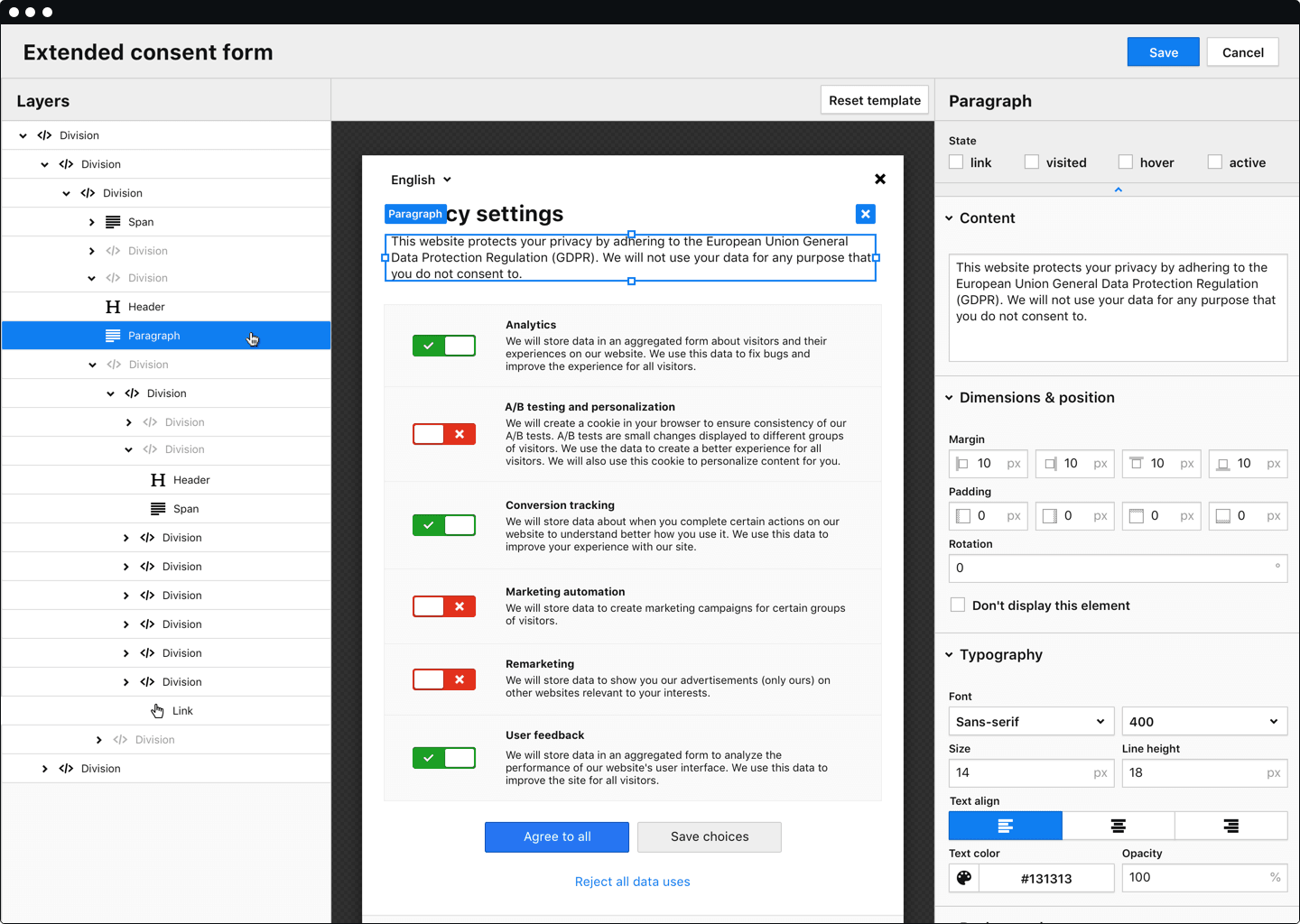
Cookie Information
Cookie Information is a leading consent management platform, trusted by thousands of organizations globally to meet GDPR and other privacy law requirements. It offers extensive features such as automatic cookie detection and categorization, customizable banners, consent log retention, and support for frameworks like IAB TCF 2.2.
With out-of-the-box support for 44 languages and seamless integration with platforms like Piwik PRO, it’s an ideal solution for businesses of all sizes seeking robust compliance, transparency, and ease of implementation.

Cookiebot
Cookiebot CMP provides transparency and control over all the cookies and similar tracking technologies on your website. It enables proper compliance with privacy legislation through respectful and transparent data exchange between users and the websites they visit to make privacy an integrated part of each site.
Usercentrics
Usercentrics allows businesses to collect, manage, and document user consents across websites and apps, ensuring compliance with global privacy regulations. It provides smooth capture and management of user preferences and marketing permissions, empowering users with complete control over their data.
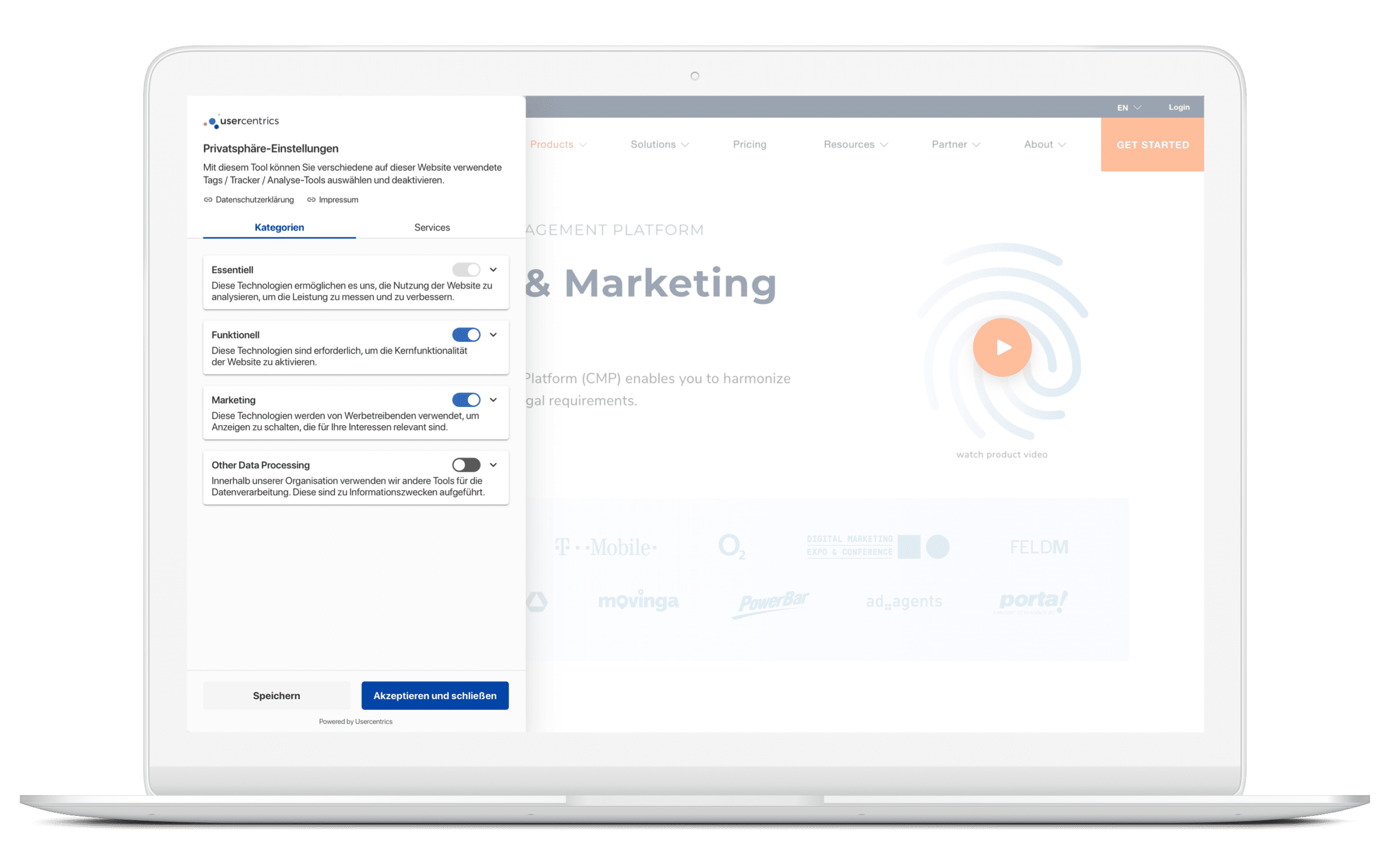
OneTrust
OneTrust provides privacy management and marketing compliance technology that helps organizations comply with global regulations. The platform lets you visualize and manage the data coming into your organization while ensuring compliance and honoring customer rights, choice, and transparency.
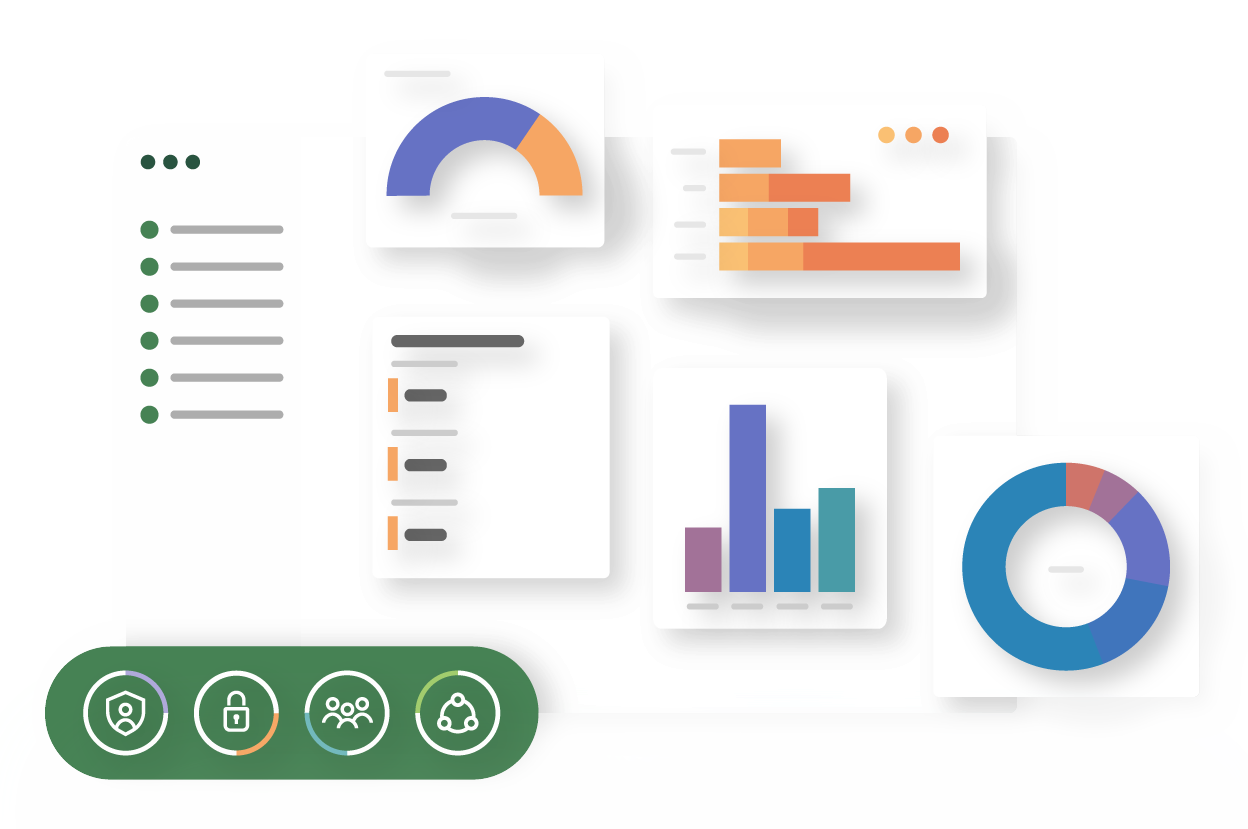
UniConsent
UniConsent is an independent CMP that helps publishers and marketers align with privacy laws like ePrivacy, GDPR, and CCPA. It offers a variety of additional features, like cookie scanning and disclosure, cookie banners, and data subject requests management, as well as consent analytics and insights.
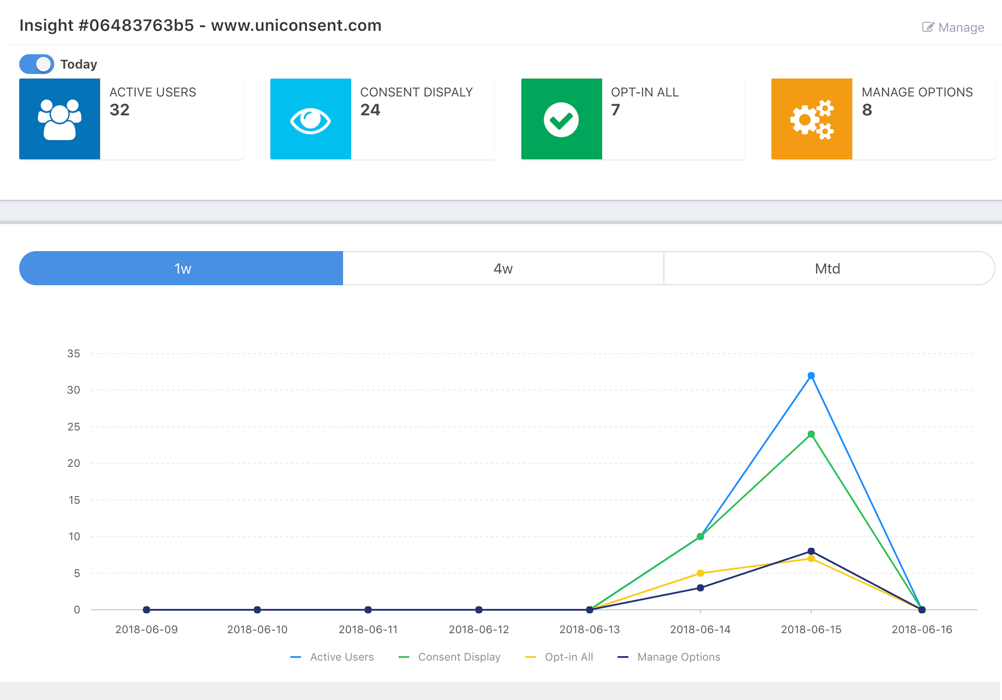
Didomi
Didomi is a comprehensive suite with a wide range of integrations. Its focus on quality user experience and compliance with major data privacy laws helps companies put customers in control of their data, generating trust and revenue. It is a robust consent management platform perfect for users who can harness its customization options and integration capabilities.
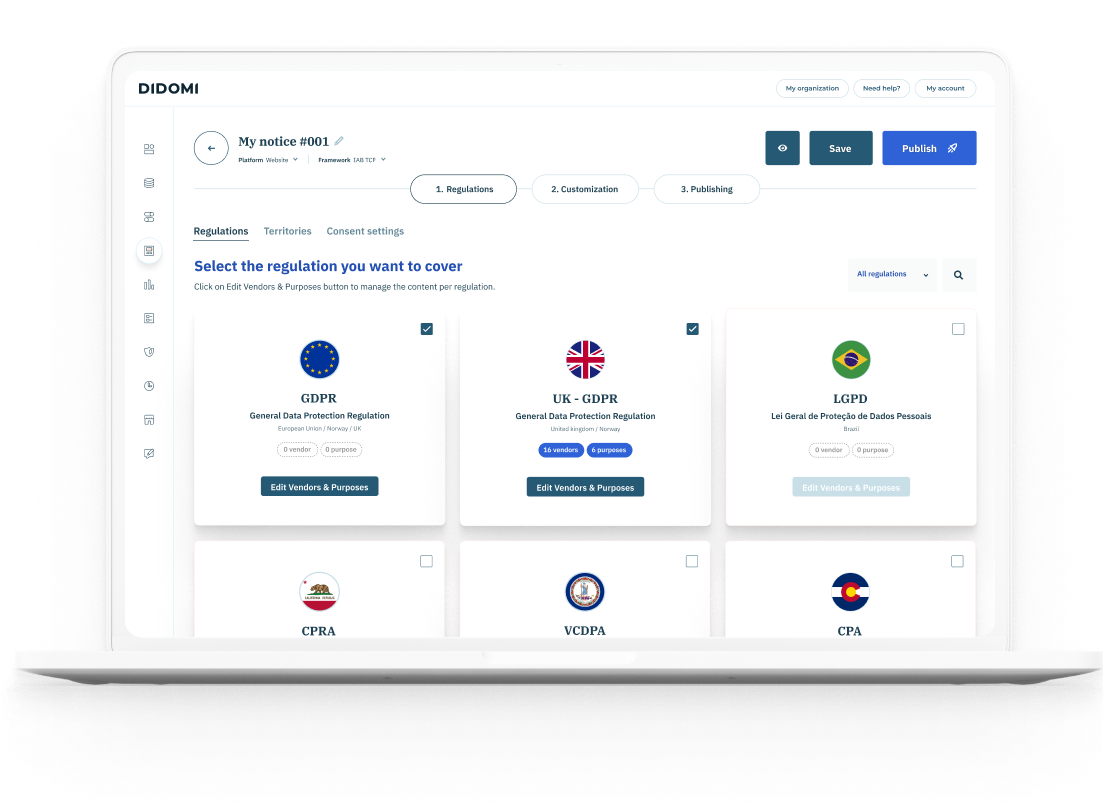
Osano
Osano offers a range of tools and solutions to ensure compliance with data protection regulations and effectively manage user consent. It supports value-added services for analyzing and mitigating risks associated with third-party vendors, along with customizable cookie consent banners.
CookieYes
CookieYes offers a straightforward platform with essential functionalities, such as a fully customizable cookie banner, tracking user consent, or a unified interface. It’s a simple tool focusing on its core consent management processes. The platform delivers a quick path to compliance at a low cost.
Ketch
Ketch is a comprehensive privacy management platform offering features such as data usage and storage management, consent management, risk assessment, and handling data subject access requests. While it provides robust tools for privacy compliance, its focus is primarily aligned with U.S. regulations. Some of its messaging and features are not fully compliant with GDPR, which positions it as a stronger fit for U.S.-based companies rather than those targeting the EU market. As such, Ketch may be a competitive choice for enterprises seeking AI-based privacy solutions tailored to the U.S. regulatory landscape but is less suitable for businesses with a GDPR-centric compliance strategy.
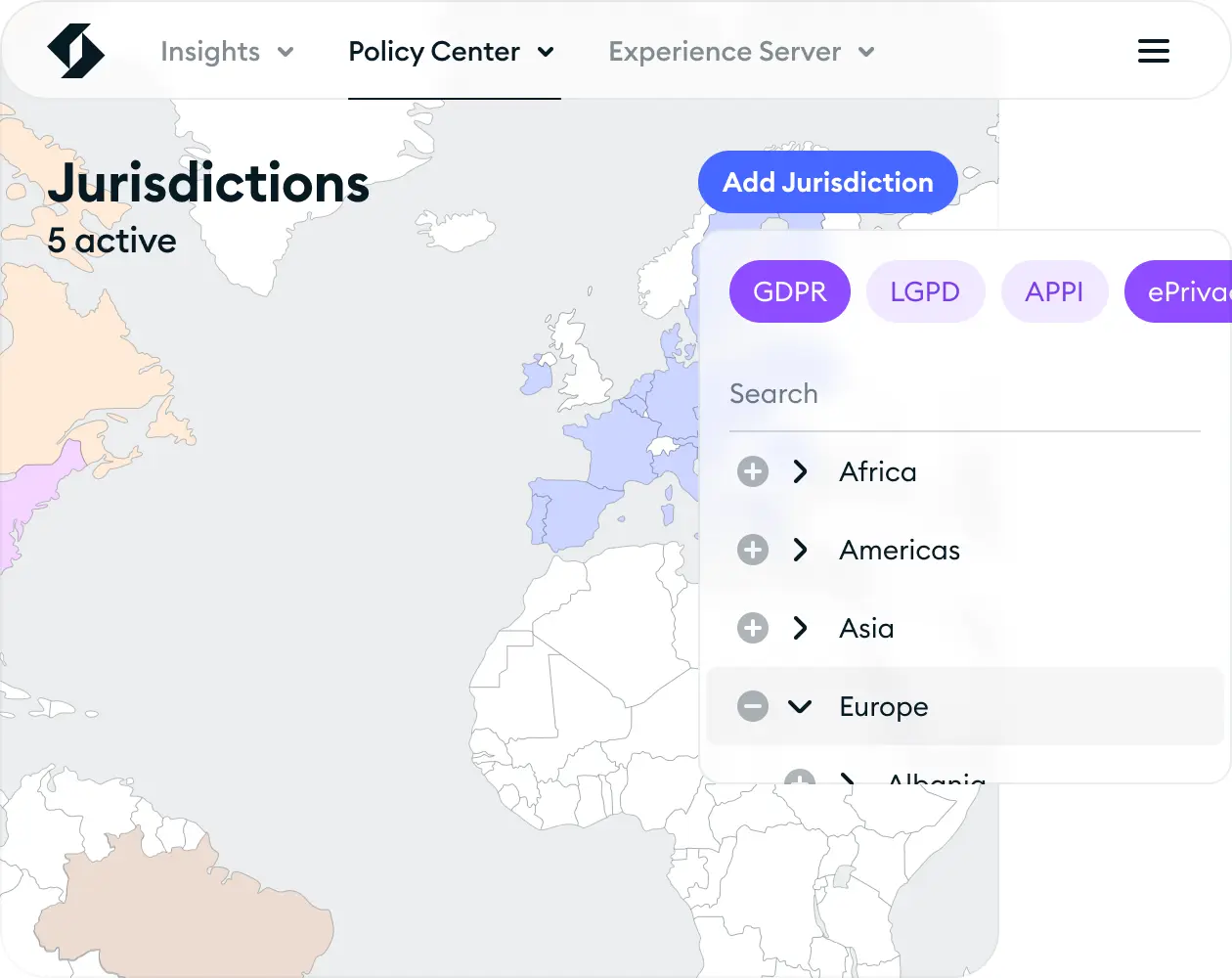
What we have covered in our CMP comparison
Our comparison consists of the following sections:
General overview
This section includes the most important features of the analyzed consent managers. You can see what hosting options are available, such as private cloud hosting or choosing data residency. Also, you can check which platforms have ISO 27001 certifications.
It’s also important to know whether these platforms comply with the General Data Protection Regulation (GDPR) that gives individuals full control over their personal data.
| Type of hosting | ISO 27001 certified | GDPR compliance | 100% data ownership | |
|---|---|---|---|---|
| Piwik PRO | Cloud or private cloud | |||
| Cookie Information | Cloud | |||
| Cookiebot | Cloud | |||
| Usercentrics | Google cloud servers | |||
| OneTrust | Cloud, private cloud or on-premises | |||
| UniConsent | Cloud | |||
| Didomi | Cloud | |||
| Osano | Cloud | n/a | ||
| CookieYes | Cloud | n/a | ||
| Ketch | Cloud | n/a |
Features and functionalities
Check if the platform enables reporting features and dashboards, the option to export reports, or view user consent history. Learn which privacy-facing features related to cookies are available – for example, cookie scanning to detect what cookies load on the site, zero-cookie load that lets you comply with some strict laws, or cookie whitelisting. Some tools may also include Do-Not-Track support, cookie library, or can share consent across various domains.
Find out which vendors allow you to re-ask users for consent or offer real-time geotargeting. See if you can display the consent banner in different languages and whether the visitor’s language will be automatically detected. For example, Cookie Information supports features like zero-cookie load, consent log retention, and language localization – all designed to ensure both legal compliance and a smooth user experience.
Integrations
Check which consent management platform offers integrations with Google Consent Mode, v.1 and 2, Microsoft Universal Event Tracking (UET) Consent Mode, and Google Tag Manager. Such capabilities simplify compliance with data privacy regulations, enhance user experience, and streamline tag management processes, ultimately benefiting both users and businesses.
| Google Consent Mode | Google Consent Mode v.2 | Google Tag Manager | |
|---|---|---|---|
| Piwik PRO | |||
| Cookie Information | |||
| Cookiebot | |||
| Usercentrics | |||
| OneTrust | |||
| UniConsent | |||
| Didomi | |||
| Osano | |||
| CookieYes | |||
| Ketch |
Banner customization options
Highly customizable consent banners can be adjusted to match your organization’s design and brand voice. Learn if you can visually customize the banner and the consent text, create the popup or bar layout, and add visual elements. Also, discover which consent management platform offers pre-built templates compatible with IAB TCF.
To check which of your banners perform better, you should also be able to perform A/B testing. One of the key features to look for in a CMP vendor is the ability to set consent collection for specific purposes, which we also include in this section.
| Visual customization | Popup layout | Bar layout | Ability to add visual elements | |
|---|---|---|---|---|
| Piwik PRO | ||||
| Cookie Information | ||||
| Cookiebot | ||||
| Usercentrics | ||||
| OneTrust | ||||
| UniConsent | ||||
| Didomi | ||||
| Osano | ||||
| CookieYes | ||||
| Ketch |
Data subject access requests
Processing data subject requests is a significant benefit of using a CMP. Find out if the compared tools allow you to handle data subject requests and if they offer data subject request widgets.
Customer care
Customer support helps solve some issues you might experience with the CMP platform. If you need troubleshooting or assistance in configuration, it’s crucial to get the support you need from the vendor’s customer care department. Find out what customer support features are available – such as contact via email, online help center, or community forum.
Some vendors may offer more personalized assistance, like a dedicated support specialist. You might opt for personalized onboarding or training or benefit from custom integrations and development if needed.
Comparison of 10 leading consent management platforms
If you want more details about the most popular consent management platforms and how they stack up against each other in more categories than listed in the article, download our whitepaper (in English). The comparison includes insights from the recent merger between Cookie Information and Piwik PRO, reflecting their combined capabilities for enterprise-grade privacy and analytics solutions.






